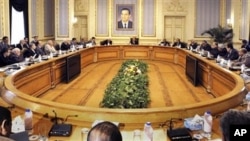The Egyptian government on Sunday offered a package of concessions after an unprecedented meeting with the officially banned Muslim Brotherhood as well as other opposition figures.
However, the opposition is divided over how to bring about an end to President Hosni Mubarak's nearly 30-year rule. Despite the talks, protesters rallied for a 13th day in Cairo and other cities.
The newly appointed Egyptian vice president, Omar Suleiman, met with representatives of some opposition groups, including the Muslim Brotherhood, which is officially banned in Egypt.
After the talks, the government said the participants had agreed on a package of concessions that include freedom of the press, the release of detained protesters and the eventual lifting of emergency laws.
But the opposition is divided. George Ishaq of the Kefaya movement, which is boycotting the talks, says any government concession is a nonstarter as long as President Hosni Mubarak remains in power. "We (will) never open our mind or make negotiations before Mubarak leaves. We insist about that. After that, we can open doors to negotiations," he said.
Still, the talks were a milestone because it is the first time Mr. Mubarak's regime openly met with representatives of the Muslim Brotherhood.
One protester on Tahrir Square said he worries the group's ultimate aim is to turn Egypt into an Islamic state. "I'm Muslim, but I do not like Iran, like Hezbollah or something like that," he said.
|
Key Players in Egypt's Crisis
|
Although the Muslim Brotherhood is banned, its members have run as independents in elections. In 2005, they captured around 20 percent of the vote.
But the group now is deliberately taking a back seat in the protests. A spokesman has credited young Egyptians with starting the uprising. And several days ago, the Brotherhood said it will not field a candidate in the next presidential election.
Fahmy Howeidy is a columnist for the daily newspaper, Shorouk. "What else can they do? They issued a statement, they participated in the last Parliament, they did not talk about Sharia or even an Islamic state, stuff like that, but ((talked about)) defending the people's demands. And they are still doing that," he said.
At Tahrir Square, tens-of-thousands of protesters rallied for a 13th day. Calling this the "Day of Martyrs," Muslims and Coptic Christians offered prayers for the hundreds of pro-democracy activists killed since their uprising began. And one young, just married couple showed up in in their wedding attire.




